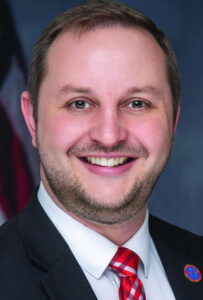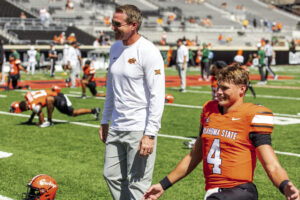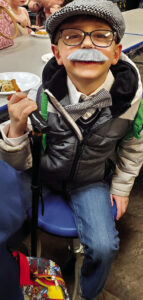Facebook changes the way we live
College is an exciting time where new friends are made, new experiences are had and the possibilities for the future are seemingly endless, so it’s no surprise that when high school seniors graduate and set out for college, they often hear the phrase, “You can change the world.”
Several years ago, one college sophomore took that advice quite seriously, and the social media experiment he toyed with in his dorm room at Harvard University ultimately changed the way the world communicates.
The college sophomore in question is Mark Zuckerberg and the social media experiment that changed the way the world communicates is, of course, the wildly popular Facebook.
In its early stages in 2004, Facebook was only open to students at Harvard University, but eventually, the site was opened up to other colleges. High school students were included in 2005 and in September of 2006, Facebook finally allowed access to any user over the age of 13 who had a valid e-mail address.
According to the site itself, Facebook now has over 500 million active users and, on any given day, 50 percent of those users log on to the site. Those users then, on average, spend a collective 700 billion minutes every month checking status updates and connecting with friends and family.
When Facebook was only open to college students, the main function of the site was to communicate with other college students. The site was useful in catching up with friends, finding out from classmates what kind of homework assignments they might have missed and keeping up-to-date with activities happening around campus.
Now that Facebook is open to anyone 13 and older, people use the social networking site for a myriad of different reasons, which several Franklin County residents can attest to.
People in the area still use the site for social networking and to reconnect with family and friends.
Red Bay resident Don Holcomb first joined Facebook a year ago as a way to keep in touch with his children.
“My wife and kids were already on Facebook and they would talk back and forth and share information about themselves and our grandkids,” Holcomb said. “They were getting family information that I wasn’t getting so I decided to join so that I could keep up with them in a way that was easier for all of us.”
Holcomb, who grew up in the western suburbs of Chicago and served with the United States Army, has also used Facebook to reconnect with people he hasn’t seen in many years.
“There are so many people on Facebook now that it’s fairly easy to find them,” Holcomb said. “I have been able to reconnect with a friend of mine from basic training in ’71, several of my Chicago friends from the ‘60s and college friends from when I attended Northeast Mississippi Community College and Mississippi State.
“Like anything else, Facebook can be abused, but I use it to keep up with people I know. I enjoy being able to see pictures because you’re probably not going to just run over to someone’s house that you might only visit once a year and say, ‘Hey, can I see your photo albums?’
“This way, I can see the pictures people upload and I can also see pictures of my grandchildren.”
In addition to keeping in touch, several local churches have realized that Facebook can be a valuable tool to spread the word about activities or other church-related topics.
“As the pastor of a local church, I must utilize every avenue of communication possible.,” Russellville First United Methodist Church pastor Alan Beasley said. “Facebook has grown in popularity to the point where every church can benefit from the number of people who are part of the Facebook community. Whether it is passing along information, announcing an event, or sharing an inspirational thought, Facebook is helpful in communication and often times dialogue ensues. It is just one more tool in helping me and churches communicate.”
Calvary Baptist Church youth minister Ryan Mouser deals with a group that is constantly checking their Facebook profiles for the latest updates, so he said he has definitely found the website to be useful in his ministry.
“Facebook is an excellent way for me or my wife to connect with most all of our kids in a very quick and easy way in about five minutes,” Mouser said.
“I also believe that Facebook is useful to me as a youth pastor for two distinct reasons. For one, I am constantly encouraged when I get on Facebook because most of our kids are writing encouraging words on here for everyone to see about their relationship with Christ. They emphasize what He has done, what He is doing, and most of all, what they pray He will do in the future.
“Also, I feel it is useful because I am able to send out quick devotions or recite some Scripture and nine times out of 10, the kids will respond to what you say on a computer more than they would if you were saying it in person.”
Several businesses and organizations have also utilized Facebook as a means to release pertinent information to the community around them.
The Russellville Police Department has a Facebook page that is strictly used for posting updates Russellville Police Chief Chris Hargett feels citizens should know about.
“With the Facebook page, we’re able to post updates from our handheld phones so that we can keep the community informed of pertinent information,” Hargett said.
Hargett added that utilizing this kind of technology will be important in weather situations like the snow the area experienced this winter or severe weather like tornado watches and warnings.
Officers can post updates about road conditions, traffic accidents, and can inform citizens about recent crime sprees, missing persons or suspects the RPD might need help locating.
“To be the most efficient at what we do, it’s important to keep up with the newest technology,” Hargett said. “By continuously evolving, we will only be able to get better and better at serving the community.”
With the recent earthquakes and the tsunami in Japan, people right here in Franklin County have been able to communicate with friends and family to make sure they are doing okay in the midst of all the turmoil the Asian country is suffering through.
Russellville resident Rhonda Crutchfield has been able to keep in touch with high school friend and fellow church member Jeff Frame. According to Crutchfield, Frame works for the Toyota company and was in Japan training for his job when the earthquake occurred.
“I always turn the news on first thing in the morning and when I heard of the quake and resulting tsunami, I immediately thought of Jeff,” Crutchfield said. “I knew he had been posting on Facebook all along, describing the sights, food, their daily schedule and such, so I went to check. Sure enough, he had posted at 3:30 a.m. our time that they had felt the quake, the building shook, but he and the rest of the team he was working with were all okay.
“The really good news came when he posted they had decided to bring them home early. He’s kept us posted with his flight schedule and updating when he changed planes in various cities, and he was able to return home Thursday.”
While many people think Facebook is useful communication tool, there are some who realize that, like anything else, it has its downfalls as well.
Russellville graduate Anna Stanford currently lives in Concord, N.H., while she attends law school at the Franklin Pierce Law Center. Stanford said she enjoys using Facebook to keep up with major events back home like classmates who are having a baby or who have gotten married or the recent hiring of a new football coach.
“I know about the big things that happen, but Facebook doesn’t replace a phone call from my family or my friends,” Stanford said. “It sometimes can really be a distraction, too, which prompted me recently to deactivate my page for a while. It’s entertaining, but there are other forms of communication I can enjoy that won’t hinder me from doing what I need to be doing.”
Mouser added that, no matter what age someone may be, the site can be an avenue for heartache or discord if used in the wrong way.
“Facebook can be used for as much negativity and discouragement anybody would ever want to deal with,” Mouser said. “However, it can be used for as much good and encouragement that anyone could ever want to give. It just depends on how you use it.”








